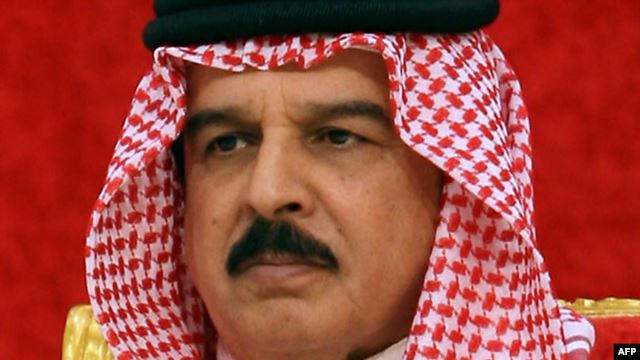Bahrain holds new reconciliation talks
| Publisher | Radio Free Europe/Radio Liberty |
| Publication Date | 11 February 2013 |
| Cite as | Radio Free Europe/Radio Liberty, Bahrain holds new reconciliation talks, 11 February 2013, available at: https://www.refworld.org/docid/512235dcc.html [accessed 4 November 2019] |
| Disclaimer | This is not a UNHCR publication. UNHCR is not responsible for, nor does it necessarily endorse, its content. Any views expressed are solely those of the author or publisher and do not necessarily reflect those of UNHCR, the United Nations or its Member States. |
February 11, 2013
By RFE/RL
 Bahrain's monarchy, led by King Hamad bin Isa al-Khalifa, has kept a firm grip on the country's affairs.
Bahrain's monarchy, led by King Hamad bin Isa al-Khalifa, has kept a firm grip on the country's affairs.
The government and opposition representatives in Bahrain have launched a new round of reconciliation talks – the first such meetings since 2011.
The talks began February 10, and another round is scheduled for February 13.
The talks are aimed at resolving the conflict between the country's Western-backed Sunni Muslim rulers and the opposition, whose members mainly come from the Shi'ite majority.
The Shi'ites want the ruling monarchy to surrender its monopoly on power and allow an elected government that would most likely include Shi'ites in top-level roles.
The tiny Gulf island kingdom has been roiled by unrest since the opposition launched mass pro-reform protests in early 2011 during the Arab Spring revolts.
The protests were crushed by security forces, but demonstrators have continued to press for change in Bahrain, a Washington ally which hosts the U.S. Fifth Fleet.
The new dialogue was launched just days before the second anniversary of the opposition uprising that began on February 14, 2011.
The government and its Gulf Arab supporters have sought to portray the opposition as acting at the behest of Shi'ite-led rival Iran. This is denied by the opposition and Tehran.
Opposition supporters have been demonstrating for more than a week ahead of the anniversary of the unrest, during which at least several dozen people died in clashes with security forces.
As the talks at a resort south of Manama got under way, security forces were deployed in mainly Shi'ite areas to guard against fresh unrest.
The dialogue session included 27 participants, including the justice minister, the education minister and the works minister.
Western Pressure
The other participants included eight representatives from the opposition, eight from pro-government parties, and eight from the national assembly.
The opposition quit the last reconciliation talks in July, 2011, saying negotiations were not carried out fairly.
Under pressure from its Western allies, the government has pledged efforts, including more transparency, to encourage a better result this time.
However, the government has not indicated it will consider reforms that could weaken the monarchy's control over the country's affairs.
The opposition, led by the Wefaq movement, is demanding creation of a constitutional monarchy with an elected prime minister.
The current prime minister is Khalifa bin Salman al-Khalifa, an uncle of King Hamad.
The opposition also says Shi'ites face systematic discrimination and are excluded from top-level government and military roles.
The United States has supported negotiations among the Bahraini parties, but has also continued to back the monarchy, in part because of Washington's military ties to the country.
U.S. officials have criticized some of the harsh measures imposed by the government, including stripping 31 Shi'ite activists of citizenship.
Based on reporting from AFP, Reuters and AP
Link to original story on RFE/RL website
